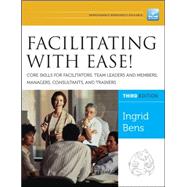
Facilitating with Ease! Core Skills for Facilitators, Team Leaders and Members, Managers, Consultants, and Trainers
by Bens, Ingrid-

This Item Qualifies for Free Shipping!*
*Excludes marketplace orders.
Buy Used
Rent Book
New Book
We're Sorry
Sold Out
eBook
We're Sorry
Not Available
How Marketplace Works:
- This item is offered by an independent seller and not shipped from our warehouse
- Item details like edition and cover design may differ from our description; see seller's comments before ordering.
- Sellers much confirm and ship within two business days; otherwise, the order will be cancelled and refunded.
- Marketplace purchases cannot be returned to eCampus.com. Contact the seller directly for inquiries; if no response within two days, contact customer service.
- Additional shipping costs apply to Marketplace purchases. Review shipping costs at checkout.
Summary
Author Biography
Ingrid Bens is a consultant and trainer whose special areas of expertise are facilitation skills, team building, conflict management, and employee and organizational change. Bens is the founder of both Participative Dynamics, a consulting firm located in Sarasota, Florida, and Facilitation Tutor, an on-line learning portal.
Table of Contents
Chapter 1 Understanding Facilitation
What Is Facilitation?
What Does a Facilitator Do?
What Do Facilitators Believe?
What Are Typical Facilitator Assignments?
Differentiating Between Process and Content
Facilitation Tools
Core Practices Overview
What Does Neutral Mean?
How Assertive Can a Facilitator Be?
The Language of Facilitation
Conversation Structures
Starting a Facilitation
During a Facilitation
Ending a Facilitation
The Rules of Wording
Effective Note Taking
Focus on Questions
Best and Worst Facilitation Practices
Chapter 2 Who Can Facilitate?
When to Use an Internal Facilitator
When to Use an External Facilitator
When Leaders Facilitate
Facilitation Strategies for Leaders
Best and Worst Facilitation Practices for Leaders
Facilitation as a Leadership Style
Additional Role Challenges
Chapter 3 Facilitation Stages
1. Assessment and Design
2. Feedback and Refinement
3. Final Preparation
4. Starting a Facilitation
5. During a Facilitation
6. Ending a Facilitation
7. Following Up on a Facilitation
Seeking Feedback on Your Facilitation
Chapter 4 Knowing Your Participants
Conducting an Assessment
Group Assessment Survey
Comparing Groups to Teams
Understanding Team Stages
Forming—The Honeymoon Phase
Storming—The Potential Death of the Team
Norming—The Turning Point
Performing—The Ultimate Team Growth Stage
Adjourning—The Final Stage
Facilitation Strategies Chart
Team Effectiveness Survey
Chapter 5 Creating Participation
Creating the Conditions for Full Participation
Removing the Blocks to Participation
High-Participation Techniques
Group Participation Survey
Encouraging Effective Meeting Behaviors
Group Behaviors Handout
Peer Review
Peer Review Worksheet
Chapter 6 Effective Decision Making
Know the Four Types of Conversations
The Four Levels of Empowerment
Clarifying the Four Empowerment Levels
Shifting Decision-Making Paradigms
The Decision-Making Options
Decision Options Chart
The Importance of Consensus
Things to Watch for in Decision Making
Effective Decision-Making Behaviors
Steps in the Systematic Consensus-Building Process
Consensus-Building Worksheet
Symptoms, Causes and Cures of Poor Decisions
Decision Process Survey
Chapter 7 Facilitating Conflict
Comparing Arguments and Debates
Steps in Managing Conflict
The Five Conflict Options
Conflict Management Norms
Giving and Receiving Feedback
Making Interventions
Wording an Intervention
Dealing with Resistance
The Right Approach
Common Conflict Dilemmas
The Collaborative Conflict Management Process
Interpersonal Conflict Worksheet
Group Conflict Checklist
Conflict Observation Sheet
Conflict Effectiveness Survey
Chapter 8 Meeting Management
Meetings That Work
Our Meetings Are Terrible!
The Fundamentals of Meeting Management
Sample Process Check Survey
Sample Exit Survey
Meeting Effectiveness Survey
Facilitating Virtual Meetings
Chapter 9 Process Tools for Facilitators
Visioning
Sequential Questioning
S.W.O.T.
S.O.A.R.
Facilitative Listening
Gallery Walk
Brainstorming
Written Brainstorming
Starbursting
Affinity Diagrams
Multi-Voting
Gap Analysis
Force-Field Analysis
Root-Cause Analysis
The Five Whys
Multi-Voting
Decision Grids
Needs and Offers Dialogue
Constructive Controversy
Exit Surveys
Survey Feedback
Systematic Problem Solving
Systematic Problem Solving Worksheets
Troubleshooting
Troubleshooting Worksheet
Chapter 10 Process Designs
Introduction to the Sample Agendas
Sample Design 1 Creating a Mission Statement and Objectives
Sample Design 2 Work Planning, Roles, and Responsibilities
Sample Design 3 Priority Setting/Cutback Planning
Sample Design 4 Inter-Group Negotiation
Sample Design 5 Finding and Solving Problems
Sample Design 6 Core Program Development
Sample Design 7 Survey Feedback/Issue Census
Sample Design 8 New Leader Integration
Sample Design 9 Transition Planning
Sample Design 10 Process Improvement
Sample Design 11 Project Retrospective
Sample Design 12 Team Adjournment
Session Planning Worksheet
About the Author
Acknowledgments
Additional Resources
Bibliography
An electronic version of this book is available through VitalSource.
This book is viewable on PC, Mac, iPhone, iPad, iPod Touch, and most smartphones.
By purchasing, you will be able to view this book online, as well as download it, for the chosen number of days.
Digital License
You are licensing a digital product for a set duration. Durations are set forth in the product description, with "Lifetime" typically meaning five (5) years of online access and permanent download to a supported device. All licenses are non-transferable.
More details can be found here.
A downloadable version of this book is available through the eCampus Reader or compatible Adobe readers.
Applications are available on iOS, Android, PC, Mac, and Windows Mobile platforms.
Please view the compatibility matrix prior to purchase.
